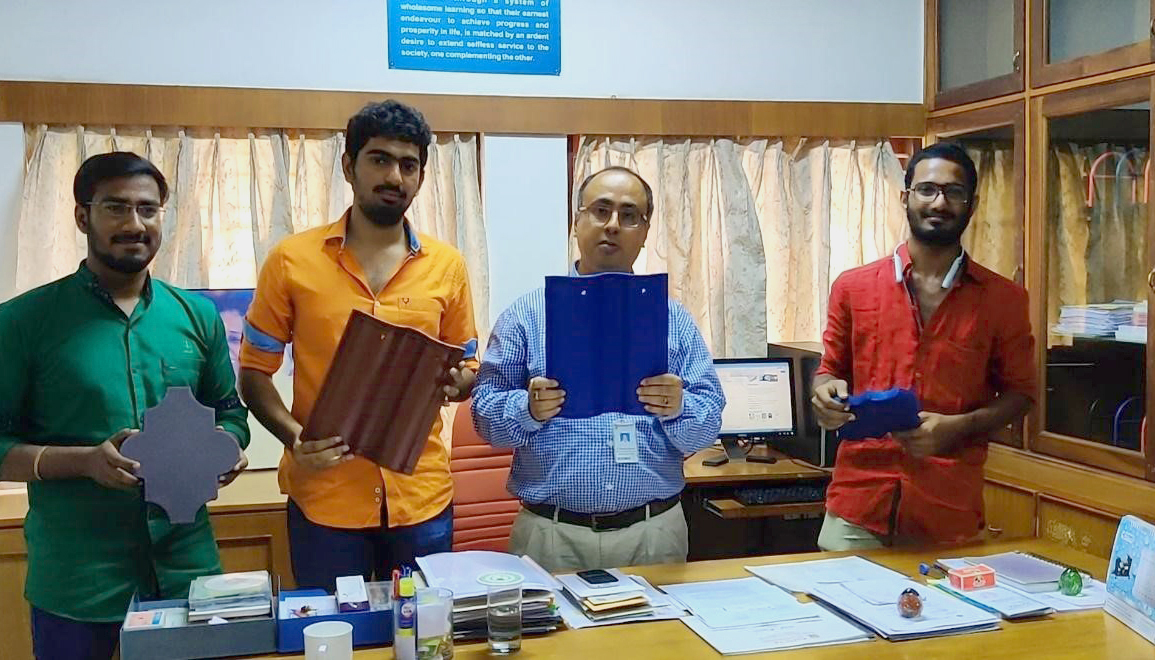Aerospace students Mr. Akash Vineet, Mr. Akash Jayakumar and Mr. Abhihas Balaji from Amrita Vishwa Vidyapeetham, Coimbatore campus under the guidance of Dr. Shantanu Bhowmik, Professor: Department of Aerospace Engineering and Head Research and Projects, Amrita School of Engineering, Coimbatore have developed a technology to convert single-use plastics into products like floor tiles, roof tiles etc.
The project was supported by Amrita Technology Business Incubator (TBI) with the grant of Rs. 10,00,000 (US $1,200) from Nidhi- Prayas. The students have incorporated a recycling startup R-Cube Plastics incubated at Amrita TBI.
They have developed low cost and low weight roof tiles and pavement tiles. A single pavement tile could withstand up to 2 tonnes of compressive load. The strength of the product is equivalent to concrete and is made from 100% recycled plastic.
Problem & Solution
Plastic is the most used man-made material in the world. It plays a major role in almost all industries like packaging, electronics and appliances, construction and transport. Unfortunately, most of the plastic items are a one-time use product that are then thrown into the environment. Due to their non- degradable nature, they are harmful to the environment. They are thrown into the ocean or huge garbage mountains in landfills.
The reasonable way to get rid of all plastics would be by recycling them into products with a longer lifespan. But in the process of recycling the properties of plastics are reduced by half to that of virgin plastics, due to which only 9% of the total 9 billion tonnes of plastic has been recycled.
Even though the use of single use plastics has been banned, that will just account to 5-10% of the plastics waste generated. 90% of the plastics generated per day were left and 9 billion tonnes of plastic.
The major disadvantage of recycled plastics is its quality and strength. Through the process done by the team, they provided recycled products to customers with better property at a lower cost than virgin plastics.
Their solution can be applied to all the major plastics in the plastic industry namely LDPE, HDPE, PET, PP. The competitors have an efficient way to only recycle plastic bottles (PET). The plastic industries can be considered as a competitor. They only introduced 10% of the recycled plastic in their virgin production. But the trio was able to create products using recycled plastics.
Target Market
Their products may drastically help to improve the environment and 73% of the millennials are ready to pay more if the products have a cause or if it’s helpful to the environment. According to the latest trending data, 90% of millennials will buy from a brand whose social and environmental practices they trust, and 95% of them will recommend that brand to a friend. So, their target market would be millennials.
Products
The main advantage of their raw material is that it is moldable into any desirable products. So that, based on the location and the needs they can decide the production of the product. Some examples where their raw material can be potentially used are
● Lumber
● Roof Tiles
● Floor Tiles
● Tabletop Planks
● Bench
● Doors
● Divider Blocks
● Bins
● Boat


The beneficiaries of the innovation
Environment : Non-degradable plastics are harmful to the environment. They are thrown into the ocean or made into huge garbage mountains in landfills.
Living organisms: When the plastic waste is thrown into the ocean the aquatic animals mistake those plastic waste for food and consume them, because of which many aquatic species are in the verge of extinction.
When encountered by UV rays in the ocean, plastics also break down into micro plastics. This is in turn consumed by plankton, thus entering into the food chain and affecting almost all the living organisms in our world.
Country’s economy : By recycling plastic wastes we can create six times more jobs than just dumping plastic waste. The waste plastics need not be dumped in landfills which occupies real estate which can be used for city developments.





